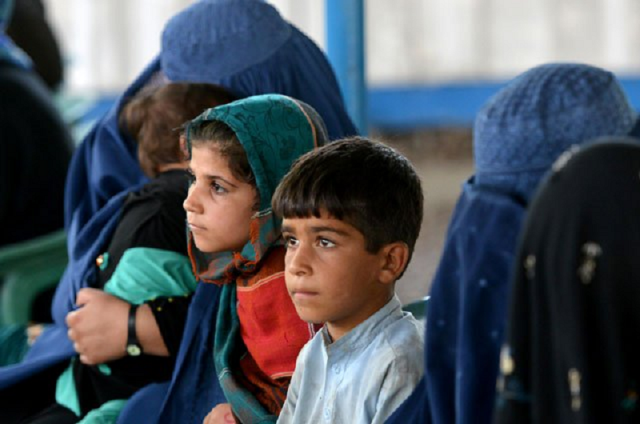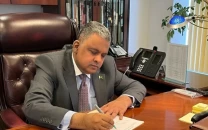Illegal migrants brace for action as deadline ends
Cabinet approves work plan for deportations from tomorrow; deadline for voluntary returns expires today

The government was unwavering on Monday in its decision to evict all the foreigners residing illegally in the country, as the caretaker cabinet approved a work plan for a phased deportation from Wednesday (tomorrow) immediately after the expiry of the October 31 deadline for their voluntary return.
Prime Minister Anwaarul Haq Kakar and his two cabinet ministers, Sarfaraz Bugti and Murtaza Solangi, confirmed that the deadline for the illegal aliens in Pakistan would not be extended. They stressed that the crackdown would equally apply to all the undocumented foreigners.
The crackdown is part of a broader effort to improve national security and to address the challenges posed by illegal immigration. The government has also stated that it wants to protect the rights of Pakistani citizens and to ensure that they have access to jobs and other resources.
On October 3, an apex committee of the National Action Plan (NAP) meeting chaired by Caretaker Prime Minister Anwaarul Haq Kakar had given all foreign nationals living illegally in the country until October 31 to leave voluntarily or face deportation.
Critics, particularly the UN High Commission for Human Rights (UNCHR) and other international organisations, had raised concerns over what they described as inhumane deportation of nearly 1.7 million Afghans.
However, the government rejected such criticism, saying that its decision was not in violation of any international conventions. In a statement on Monday, the government reiterated its commitment to protecting those in vulnerable situations.
Briefing the media about the cabinet decisions, Interior Minister Bugti and Information Minister Solangi said that the cabinet approved a work plan for the repatriation of all those foreigners residing in the country illegally to their native countries, after the expiry of the deadline on Tuesday (today).
Under the plan, according to the ministers, the illegal refugees would be sent back in a phased manner and that they could return to Pakistan on legal documents. The two ministers insisted that the deadline for their voluntary return would not be extended.
“There is no extension or withdrawal of the deadline [for the return of the illegal refugees],” Solangi told reporters. “The prime minister [who chaired the cabinet meeting] approved a work plan for the eviction of illegally-residing refugees, under which they will be sent back in a phased manner,” he added.
Last week, the interior minister had announced that the government would open “holding centres” where Illegal immigrants would be kept for documentation before their deportation. Solangi said that the illegal aliens would be sent back to their country from the nearest point of the holding centres.
On Monday, Bugti told reporters that so far, 200,000 illegal residents have returned and he encouraged the remaining illegal foreigners to leave voluntarily. “You can come back here with a visa and do business, meet friends,” he added.
Bugti emphasised that the eviction process was only against illegal residents and not against any specific group. “Most of the [illegally-residing] people are from Afghanistan; the impression that only people from Afghanistan are being evicted is wrong,” he explained.
Bugti warned the locals of strict action if they were found involved in providing shelter to undocumented immigrants, including Afghans, after the deadline. He asked such Pakistani citizens to come forward and point out illegal aliens.
“Any Pakistani national, who will rent his house to illegal immigrants will be considered as a partner in crime and treated with an iron hand. There is an opportunity for such people to come forward and provide information about illegal residents.”
In Lahore, Kakar also emphasised that the government was repatriating all the illegal foreigners from the Pakistani soil as per the government’s policy and the relevant laws. “Such policy is not centric to only illegal Afghan nationals … but encompasses all those undocumented and illegal foreigners,” he added.
In an interaction with the students of Lahore University of Management Sciences (LUMS) during a special session, Kakar elaborated that Pakistan had hosted more than 4 million Afghan refugees for the last 40 years under the Geneva Convention, despite the fact that it was not a signatory to it.
Currently, he added, more than 1 million foreigners had been categorised as illegal, who had been staying in Pakistan without legal and valid documents. “They are being encouraged to return back to their native countries,” he continued.
Replying to a question, he maintained that all Afghans were not terrorists but involvement of certain groups in illegal activities was a problem. He referred to a suicide attack at a mosque in Khyber-Pakhtunkhwa in which the suicide bomber was identified by DNA tests as an Afghan national.
The caretaker prime minister told the students that he had already given direction to the relevant authorities of the interior ministry to ensure dignity of the repatriated women and children as there might be vulnerable groups.
Afghans poured into Pakistan by the millions over decades of conflict during the Soviet invasion, the following civil war and the US-led occupation. Around 1.3 million are registered refugees and 880,000 more have legal status to remain in Pakistan, according to the United Nations.
The government says that a further 1.7 million Afghans are in Pakistan illegally. Hundreds of thousands of Afghans are estimated to have crossed since the Taliban seized power in Kabul in August 2021. Officials say that the recent round-up is in response to rising crimes and strained resources.
The latest campaign against illegal Afghans is seen in the context of a tense relationship between Pakistan and the Afghan Taliban government, which is reluctant to neutralise the threat posed by banned Tehreek-e-Taliban Pakistan (TTP).
Official sources said that certain Western countries also wanted Pakistan to review its decision but authorities decided that there would not be any change in the deadline or the plan to evict the illegal aliens from the Pakistani soil.
“We have seen the press statement by the Office of the UN High Commissioner for Human Rights,” said a handout issued by Foreign Office Spokesperson Mumtaz Zahra Baloch. “The decision is in exercise of Pakistan's sovereign domestic laws, and compliant with applicable international norms and principles.”
Baloch clarified that the Illegal Foreigners Repatriation Plan (IFRP) “applies to all illegal foreigners residing in Pakistan, irrespective of their nationality and country of origin”, adding that Pakistan took its commitments towards protection of those in vulnerable situations with utmost seriousness.
At the same time, the spokesperson urged the international community to scale up collective efforts to address protracted refugee situations through advancing durable solutions as a matter of priority. “Pakistan will continue to work with our international partners to this end.”
(WITH INPUT FROM AGENCIES)



















COMMENTS
Comments are moderated and generally will be posted if they are on-topic and not abusive.
For more information, please see our Comments FAQ